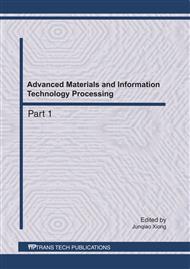p.19
p.24
p.28
p.34
p.40
p.45
p.52
p.57
p.62
Inertial Sensor Fault Diagnosis Based on an Improved Gain Principal Component Analysis Algorithm
Abstract:
An improved gain principle component analysis(PCA) algorithm is proposed for detecting the small deviation fault of the inertial sensor data. During calculating process of the Q and statistics, different gains are set to improve the small deviation fault detecting capability of some important variables. And the filtering technology is applied to reduce the noise of the sample data and emerge the misjudgment phenomenon. Numeric example result shows that the proposed algorithm can achieve fault diagnosis effectively compared with the conventional PCA algorithm.
Info:
Periodical:
Pages:
40-44
Citation:
Online since:
July 2011
Authors:
Price:
Сopyright:
© 2011 Trans Tech Publications Ltd. All Rights Reserved
Share:
Citation:


